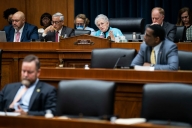You have /5 articles left.
Sign up for a free account or log in.
In a couple of days, athletes from Ohio State University and the Universities of Kansas, Kentucky and Louisville will compete in what will probably be the most high-pressure event of most of their lives: the Final Four of the National Collegiate Athletic Association's annual basketball tournament.
To make it to March Madness is every basketball player's dream, but once the players enter the Superdome in New Orleans this weekend, it's make or break.
But of course, they shouldn't be focusing on that. And if any of the athletes work with a sport psychologist on or around their campus -- and at least some of them surely do -- they won't be.
That's because sport psychologists teach students to focus on the task at hand, not the final outcome of the game or the exam they haven't studied for. And as college athletics continues to grow in wealth and scale, putting increasingly more pressure on the athletes whose non-sport demands are already considerable, the need for such consultants may be on the rise as well.
"These are all great athletes. It's just a matter of, can they bring that mentality that they know they need to have, when they need to have it, in competition?" said Craig A. Wrisberg, a professor emeritus at the University of Tennessee at Knoxville. Wrisberg used to work with athletes at the university, and now consults privately. "When they get into the heat of pressure they can choke. And a lot of them do."
Sport psychologists try to prevent that, by figuring out what's causing the breakdown and developing a routine to overcome it. Unsurprisingly, the issues are mostly mental -- Wrisberg said the athletes who went to him typically had problems in one of two categories: what they're focusing on, and how they're feeling.
Take Our Reader Survey
Help us be better. Tell us
what you like (and don't) about Inside Higher Ed.
Click here to participate.
The specialists don't have to be licensed professionals -- the work of performance consultants like Wrisberg, for instance, whose backgrounds are typically in kinesiology, overlaps significantly with that of sport psychologists. But those consultants don't cross over into some of the psychological issues that licensed staff would address, such as depression or eating disorders.
"Negative thoughts, irrelevant thoughts, outcome-related thoughts, tend to produce higher levels of tension and poor performance," Wrisberg said. "What we try to do is to break down performance into the things that they have control of and be sure that that's what they're doing every single time they attempt their sport."
So, for example, if the athlete had trouble at the free throw line, Wrisberg would train him or her to, when it's time to take the shot, focus on the target, stay relaxed, and trust their arm. And -- this one's important -- do not think about whether the point at stake will affect the outcome of the game.
Help for More Serious Issues
Athletes who are struggling with matters beyond something specific on the court, though -- something like anxiety, or a relationship on the rocks -- might be better served by a licensed sport psychologist, who can counsel an athlete as they would any student, but with a keen understanding of athletics and the unique situations athletes are in.
"Anecdotally, I believe demand has increased for in-house psychologists," Leif H. Smith, a sport and clinical psychologist at Ohio State, said in an e-mail. While many colleges now have sport psychologists, Smith said, it's still a struggle to get qualified psychologists to work in-house. "Sports psychology services have been viewed in the past as nonessential (i.e., why can't the athletes just go to the counseling center?) and I'm constantly reminding anyone who will listen that athletes face the same issues that other people face, but in a larger, less-private context."
Those colleges whose athletic departments don't employ a sport psychologist typically have some sort of relationship with the counseling center for the athletes' benefit.
"It's inadequate as far as meeting the demands of student-athletes, but until athletic departments see the importance of prevention and education with their athletes, as well as the importance of prevention and education with their athletes," Smith said, "as well as the importance of having someone on staff that the athletes trust, it will remain this way."
The lessons athletes learn by working with these individuals help them in the classroom too, Wrisberg said. "It's taking care of the stuff you have control of that is going to give you the chance to be successful, and I think they learn that principle when they get together with a performance consultant."
Dave Yukelson is a sport psychologist at Penn State University, whose athletics department was one of the first to hire for such a position. He views his job as helping students balance their athletic, academic and social lives.
"I'm here to help them focus. I'm here to help them believe in themselves. I'm here to help them develop an individualized mental plan that helps them get the most out of their development," said Yukelson, who is also a past president of the Association for Applied Sport Psychology.
Yukelson sees about 300 of Penn State's 800 athletes (and, unlike students who seek counseling generally, the male-female ratio is split pretty much down the middle). For sport psychologists, being accessible and "out there" with the athletes is key.
"In this day and age, you've got ESPN, you've got the media, you've got all this stuff about the NCAA tournament.... There's such a society emphasis on winning. And, you know, it's really not about winning, it's about the journey," Yukelson said. "Where the pressure of high-performance programs is visible, it's good that the athlete has a sounding board, a confidante who they can talk to to help them navigate the pressures and the demands."
Scott Krapf, a former track and field athlete at Illinois State University whose athletic eligibility expired in May and who is now a first-year law student at Indiana University, didn't have access to a sport psychologist at his institution. But he believes they are valuable for athletes, and should be more widely available.
"I think health and safety in general is more broad than a lot of people would think, and the impact that a lot of things have on student athletes in their lives in particular is important, and that piece of things isn't seen enough," said Krapf, who is also the immediate past chair of the Division I Student-Athlete Advisory Committee to the NCAA. "The psychological aspect of it is one of those."
All campuses should have a sport psychologist, Krapf said, if it is feasible financially.
"The lessons you learn as a student athlete are very much transferable to a number of real-life situations. But at the same time, I think there have been times when the pressures of being a student athlete are very intense, particularly at the Division I level, or sometimes it's a struggle to really achieve that full 'complete student athlete,' where you have good balance in every aspect of your life," Krapf said. "Some of those components are sometimes out of balance when you're a student athlete."
Researchers have estimated that 30 to 50 percent of Division I athletic departments contract with full- or part-time sport psychologists. Anecdotally, many believe they're becoming more common. Wrisberg compared their rise to that of strength and conditioning trainers: 30 years ago, he said, athletes didn't lift weights. Then one university hired a trainer and everyone had to accept that stronger athletes would beat weaker ones.
"You couldn't recruit an athlete these days without a strength and conditioning person," Wrisberg said. "And I think sports psychology is going to be in that position in the next five to 10 years." By which point, he predicted, every Division I athletics program will have a full-time person on staff.
But without the coach's support, a sport psychologist can't be nearly as effective, said Gloria Balague-Dahlberg, a clinical assistant professor of psychology at the University of Illinois at Chicago, and chair of the American Psychological Association's division on exercise and sport psychology.
"Coaches are interested in, 'O.K., how can this kid focus on school and how can this girl be less self-critical so they can make a free throw?'," Balague-Dahlberg said. "But coaches may not have access to the student's life, and may not feel it's their prerogative to refer a student."
A recent study by Wrisberg and his colleagues found that Division I coaches were more willing to encourage their athletes to see a sport psychologist for performance issues than for personal concerns, and were more supportive of having a person on staff in the athletic department than allowing him or her to sit in on practices and competition. The study notes that in elite sports, the coach is usually the one to decide whether a sport psychologist may work with the athletes.
Most athletes who come in for help struggle with performance anxiety, but other common issues include communication difficulties and pressure coming from sources other than athletics, like family members or school.
"In general, a lot of times athletes who are too hard on themselves cannot accept the possibility of a mistake. And of course, in sports, that's always a possibility," Balague-Dahlberg said. "The reality is that once they understand training psychological skills as one more piece of the, let's call it the performance pie, then they seek it in a very open way."
Of course, perhaps these teams have made it to the Final Four precisely because they have learned how to handle their performance anxiety. (Ohio State, Louisville and Kansas have sport psychologists on-campus; Kentucky does not.)
"A number of these teams and players have gotten there because they've survived a lot of pressure, so there may be really a self-selection issue at play here," Balague-Dahlberg said. "Yes, there is a lot at stake, but I think that's also in part what gets them going."








